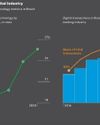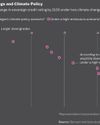
The vision of the founder is often a company’s most crucial nontransferable asset
Karl W. Smith
MOST OF THE CRITICISM of a wealth tax, an idea that is quickly becoming mainstream within the Democratic Party, revolves around its feasibility. The more compelling argument, however, is against it on principle: It would allow the federal government to undermine a central animating idea of American capitalism.
Set aside the questions of whether a wealth tax would be constitutional or how much revenue it would raise. Instead, focus on whether it could be made to work—and what it would mean if the answer is yes.
The U.S. probably could design a wealth tax that works. As economists Emmanuel Saez and Gabriel Zucman point out, European attempts at a wealth tax suffered because the tax started at too low a level and because too little was done to prevent tax competition.
Until 2018, France placed a “solidarity” tax on wealth in excess of €1.3 million ($1.4 million). The low threshold meant that those with moderately successful small businesses were subject to the tax every year, regardless of whether they were profitable. Meanwhile, the very wealthy could move to London and avoid the tax altogether. In 2006 it was estimated that 843 high-net-worth individuals left France as a result of the tax. The tax was functionally a levy on those without the means to avoid it. Predictably, this made it highly unpopular.
Saez and Zucman propose exempting at least the first $50 million, a provision that both Senator Elizabeth Warren (D-Mass.) and to a lesser extent Senator Bernie Sanders (I-Vt.) have endorsed. That would address the problem of the tax starting too low.
This story is from the {{IssueName}} edition of {{MagazineName}}.
Start your 7-day Magzter GOLD free trial to access thousands of curated premium stories, and 9,000+ magazines and newspapers.
Already a subscriber ? Sign In
This story is from the {{IssueName}} edition of {{MagazineName}}.
Start your 7-day Magzter GOLD free trial to access thousands of curated premium stories, and 9,000+ magazines and newspapers.
Already a subscriber? Sign In

See Which Countries Are Falling Behind On Climate Change
Under the Paris Agreement, 190 countries and the European Union pledged to take steps to hold the global temperature rise to less than 2C (3.6F) from preindustrial levels—and preferably 1.5C.

Billionaires Vie for the Future of Brazilian Finance
An escalating battle between two billionaires is upending the financial community in São Paulo, Latin America’s wealthiest city.

Ford Foundation's Darren Walker: ‘We Have to Get Uncomfortable'
DARREN WALKER, 62, disrupted his Wall Street life more than 25 years ago when he left what is now UBS Group AG to volunteer at a school and eventually pursue a career in community development and philanthropy. Since 2013 he’s been at the pinnacle of the philanthropic world as president of the Ford Foundation, created by the family of automaker Henry Ford during the Great Depression to advance human welfare.

Fueling the Ener Transition
I MAY BE BIASED, but some of the most important research and data on the Bloomberg terminal lies in one of its lesser-known functions: {BNEF }

Dig Into Analysts' Estimates for Disruptive Companies
THE PANDEMIC ERA generated a whole wave of disruptive companies as it accelerated the introduction of new products and services in areas including artificial intelligence, digitization, electronic payments, online meeting platforms, and virtual currencies.

Climate Risks Come for Sovereign Credit
FOR YEARS climate scientists have warned about the ferocious wildfires and hurricanes that are now overwhelming many communities. Today alarms are ringing about a related financial danger: risks lurking within government bonds, the biggest part of the global debt market.

Responsible-Investing Pioneer Lydenberg Says ESG Needs An Upgrade
STEVE LYDENBERG’S passion for social change was inspired by anti-Vietnam War demonstrations, consumer boycotts, and the movement to divest from apartheid South Africa. But he didn’t take to the streets. Instead, Lydenberg turned to the world of finance to help catalyze societal change.

Engine No. 1's Grancio: ‘People Will Appreciate an Economic Argument'
ENGINE NO. 1 sent shock waves across corporate America in May when the fledgling investment firm won a boardroom battle with Exxon Mobil Corp., securing three seats on the oil and gas giant’s board after purchasing only about $40 million of its stock.

Find Out Which Companies May Ramp Up Payouts After Covid
AS THE PANDEMIC DISRUPTED business last year, many companies cut or suspended dividends. Which will boost their payouts when economies pick up again?

Get Into the Minds of Central Bankers as They Navigate Shocks
HAVE YOU EVER WONDERED how central bankers forecast the impact of shocks on the economy?